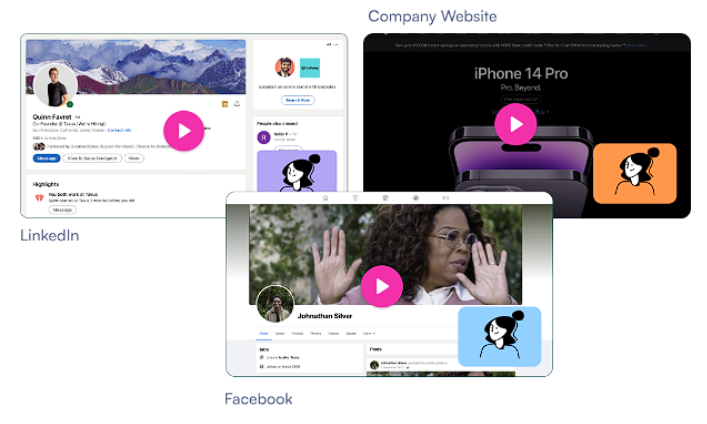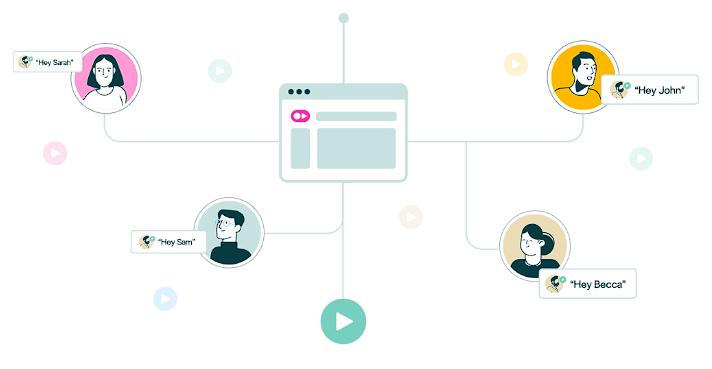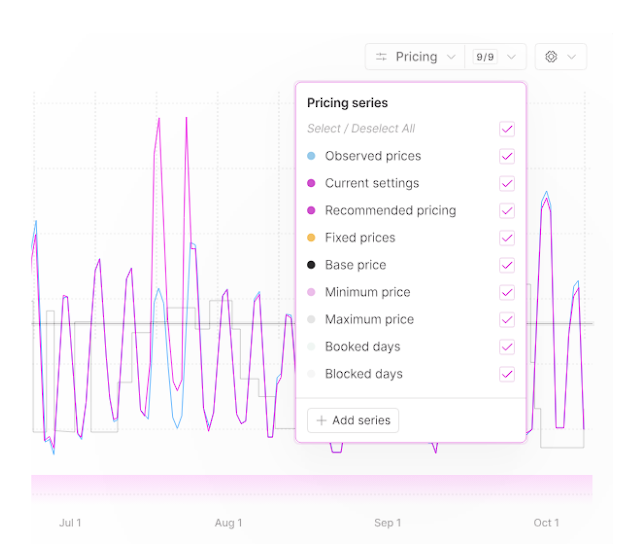All Posts
AI Marketing Guide: How It Works, Examples, & Tools [2024]


The use of AI in marketing is increasing, from content generation to outreach personalization to blog optimization. Artificial intelligence is truly changing the way brands communicate and build relationships with their audiences and it’s a critical technology for marketing teams looking to scale their success.
But what exactly powers AI's unparalleled functionality in the marketing industry? This guide will help you unravel the intricacies of the role that AI plays in the marketing of today and show real-world examples, like video messaging, that showcase its optimization capabilities.
Whether you're a seasoned marketer or just getting started, this guide shares insights into a modern era of marketing that's here to stay.
AI marketing, or Artificial Intelligence marketing, is the use of AI technologies, such as machine learning and natural language processing, to automate, optimize, and expedite marketing campaigns. It’s revolutionizing the way we market and leading to fantastic results for businesses with happier, more engaged customers.
Brands, digital marketers, e-commerce platforms, and many other businesses use AI marketing to streamline their marketing efforts and deliver more relevant and compelling content to their audiences.
From personalized subject lines to real-time interactions and optimization, these multifaceted tools make AI marketing not just a buzzword, but a revolutionary shift in modern brand communications.
Machine learning is a subset of AI that operates as the brain behind AI marketing. It enables AI platforms to systematically sift through large sets of data to detect patterns and trends.
With the addition of data analytics, AI algorithms predict consumer behavior and purchasing habits, enabling marketers to tailor their strategies with precision. Through continuous learning, these systems offer insights into what resonates most with target audiences to enable the optimum effectiveness of marketing campaigns.
Empowering conversational communications, Natural Language Processing (NLP) analyzes and understands human language in real time. Then, with the combination of sentiment analysis, brands can gauge public perception and emotional reactions to their content or products.
This combination allows for AI-generated, personalized interventions to enhance brand satisfaction and foster deeper customer relationships. Marketers can ensure these results by responding promptly to consumer sentiments.
High-quality AI tools and platforms infuse modern marketing with advanced functionalities ranging from predictive analytics to chatbots. They actively transform complex AI operations into accessible, real-world applications for marketing.
These platforms channel machine learning and data analytics to fuel predictive analytics. They sift through large data sets, detect trends, and forecast future customer behaviors, enabling marketers to craft highly targeted campaigns.
Natural language processing powers the construction and operation of chatbots. These AI assistants actively engage with customer inquiries in real time, enhancing user experience and freeing human resources.
Sentiment analysis tracks public reactions toward a brand's content or campaigns, providing insightful data for refining marketing strategies.
In essence, these AI tools actively translate intricate AI components into user-friendly marketing applications, revolutionizing the marketing realm with precision and efficiency.
Let’s review the various types of AI marketing that are setting new benchmarks for personalization and efficiency.
The advent of AI has drastically transformed content generation, creating diverse forms of content effortlessly. It actively crafts web copies, generates SEO-optimized posts, curates engaging social media content, and even devises catchy hashtags, in addition to conventional blog writing.
Take AI video generator tools like Tavus, for instance. Tavus simplifies video production by letting you record a single base video and automatically generate high-quality, personalized versions at scale.
Moreover, AI can write well-researched, SEO-optimized blog posts or articles, saving marketers considerable time. It drafts engaging social media posts and generates trending hashtags, keeping brand communication relevant and timely. It can also design compelling web copies, tailoring the language and tone to match the brand's voice and appeal to the target audience.
With AI's versatility in content generation, it not only increases efficiency and productivity but also enables marketers to keep a consistent and engaging line of communication with their audience.
.png)
Functionalities like these help businesses with brand outreach while maintaining a personal touch, allowing brands to connect more deeply with their audience.
AI-driven smart automations create more efficiency within marketing workflows. By leveraging machine learning, these systems can predict the optimal timing and channels for communication, automate campaign adjustments in real time, and ensure marketing resources are utilized with maximum efficacy. Smart automations helps marketers create marketing strategies that are more precise and adjustable.
With deeper insights into customer behavior and preferences, content personalization has become an important aspect of marketing to increase engagement, and 99% of marketers believe that personalization strengthens customer relationships.

But to truly realize its value, businesses must execute it at scale. Failing to deliver personalized experiences to a large audience leaves the benefits of personalization inaccessible for most businesses — especially larger enterprises with extensive customer bases, where manual personalization at an individual level is impractical and inefficient.
Personalized video software tools like Tavus successfully tackle this challenge with AI. They ensure that each message caters uniquely to the recipient, irrespective of audience size. In doing so, they shift personalization from a niche service to a scalable marketing strategy, driving substantial enhancements in engagement, sentiment, and ROIs across a wide customer base.
Another type of AI marketing is chatbots. AI-powered chatbots are revolutionizing customer service and engagement, providing instant, 24/7 interaction with users.
Through sophisticated natural language processing, these bots can understand and respond to a myriad of customer inquiries, offer recommendations, and guide users through the sales funnel for a responsive user experience.
Here, we explore concrete examples of AI marketing in action, showcasing how it's not just the future—it's the present!

Personalized video content has revolutionized engagement in the marketing industry, and platforms like Tavus help pave the way. Powered by Tavus’s real-time human computing platform, you can generate thousands of personalized videos from a single base recording with photorealistic lip sync and natural speech.
By understanding the emotional impact of video and creating customized video content that address viewers by name, viewers feel seen and valued, which in turn boosts conversion rates.
Here’s how Tavus works:
Personalized videos tailor content to individual viewers by incorporating personal details into the video, such as the viewer's name, purchase details, and more. They are powerful marketing tools that foster a deeper connection between the brand and the customer.
Teams that adopt Tavus often see longer session times, higher completion rates, and meaningful lifts in conversion as personalized, face-to-face content deepens engagement.

Using AI analytics, businesses create dynamic pricing models, adjusting prices in real time based on market demand, competition, and consumer behavior. This responsive strategy ensures optimal pricing to maximize profit margins while remaining competitive and accessible to the target audience.
Dynamic pricing models are used across a variety of industries where prices fluctuate based on demand, supply, or changing market conditions. Some prime examples include:
These industries use dynamic pricing models to maximize revenues, manage inventory, and align prices with market and consumer trends.

Custom messaging for offers involves personalizing promotional content based on customer data, and AI refines the process. By analyzing customer data, AI crafts offers that resonate on an individual level, delivering them at the best moment.
As an example, let’s consider an e-commerce business specializing in athletic wear.
Let's say this business has a regular customer, John, who often buys running gear - running shoes, sweatbands, and hydration packs. He's also participated in a few of the store's sponsored virtual marathons.
Using this data, the business could send John a custom message (or personalized video message) like this:
Hi John,
Thank you for being a part of our running community! As one of our enthusiastic athletes, we thought you might be interested in this:
Get 20% off on our latest collection of running shoes this weekend! Also, sign up for our sponsored virtual marathon coming next month and receive a hydration pack for free.
Keep up the pace,
[Your Company]
In this example, the offer is personalized specifically for John, based on his purchasing and participation history. The custom message recognizes him as an individual, fostering a closer brand-customer relationship and potentially boosting the success rate of the promotion.
Pro tip: For higher conversion rates, send these offers via personalized video.
The integration of AI into marketing strategies has unlocked a plethora of benefits. From soaring engagement rates to refined decision-making, AI marketing is reshaping how brands interact with their audiences.
AI marketing isn't just smart; it's profitable. By implementing AI-driven personalization, such as customized videos, conversions skyrocket, potentially as high as 500%, while email click-through rates may see a 250% increase.
This highlights the direct impact of AI marketing on a company's return on investment, making it an invaluable tool for today’s digital marketers.
The age of traditional generic marketing is over. AI enables a level of personalization that was previously unattainable, with personalized videos engaging consumers 10 times more compared to their standard counterparts.
Heightened engagement is more than just numbers; it also represents a deeper connection forged between brand and individual, powered by AI.
In these times where the competition is strong, AI stands out as a sturdy partner that enables rapid and informed decision-making.
With its ability to analyze vast datasets in a matter of seconds or minutes, AI empowers marketers to make better decisions faster, staying ahead of trends and adapting to consumer behavior in real-time. This ensures that marketing strategies remain agile and effective.
Navigating the world of AI marketing comes with its set of challenges that businesses must manage. One primary concern is the balance between personalization and privacy. As brands delve deeper into customer data to personalize experiences, they must tread carefully to protect consumer data and adhere to privacy regulations.
However, these challenges are not impossible to overcome. With Tavus, businesses can harness the power of AI while mitigating associated risks. Tavus offers scalable personalization across both video generation and real-time, face-to-face experiences, pairing a no-code studio with developer-friendly APIs to meet teams where they are—all while respecting user consent and privacy.
Its platform simplifies integration and deployment so businesses of all sizes can launch effective, personalized campaigns that resonate with their audiences and align with best practices and compliance needs.
The dynamic nature of consumer behavior and the evolution of technology calls for a new era of marketing—one that's precise, predictive, and personal. The role of AI in marketing includes bringing about deeper insights into customer journeys, more refined targeting strategies, and unprecedented levels of personalization.
Embracing this future requires a partner adept at navigating the complexities of AI marketing, and Tavus stands ready to be that guide. By integrating Tavus into your marketing strategy, you can deliver personalized videos at scale and bring face-to-face, real-time AI humans into your product—driving deeper engagement, trust, and conversion.
Leap into the future with Tavus and transform your marketing ROI.